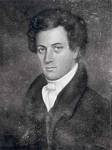Home > Nahant > Godfathers of Nahant Poetry
Nahant: Poetry by the Sea
ALONZO LEWIS
 ALONZO LEWIS (1794 – 1861)
was a historian and a poet, and Lynn’s leading intellectual
in the nineteenth century. His History of Lynn was
first published in 1829, updated in 1844, and posthumously revised
by James R. Newhall in 1865. It is the foundation for all
histories of Lynn and Nahant, and in it, Lewis argues it is probable
that Vikings landed at Nahant. As a poet, Alonzo Lewis
was known as “The Bard of Lynn,” and he established
the traditions upon which the poetry of Lynn rests. He published
three books of poetry between 1823 and 1834, and in all, fourteen
editions of his collected works were published, culimating in
the 1883 compendium, The Poetical Works of Alonzo Lewis,
edited by his son Ion. In his history, Lewis wrote, “In
summer, a day at Nahant is delightful, but a storm in winter
is glorious.”
ALONZO LEWIS (1794 – 1861)
was a historian and a poet, and Lynn’s leading intellectual
in the nineteenth century. His History of Lynn was
first published in 1829, updated in 1844, and posthumously revised
by James R. Newhall in 1865. It is the foundation for all
histories of Lynn and Nahant, and in it, Lewis argues it is probable
that Vikings landed at Nahant. As a poet, Alonzo Lewis
was known as “The Bard of Lynn,” and he established
the traditions upon which the poetry of Lynn rests. He published
three books of poetry between 1823 and 1834, and in all, fourteen
editions of his collected works were published, culimating in
the 1883 compendium, The Poetical Works of Alonzo Lewis,
edited by his son Ion. In his history, Lewis wrote, “In
summer, a day at Nahant is delightful, but a storm in winter
is glorious.”
In their history, Nahant On The Rocks (Nahant Historical
Society 1991), Stanley Paterson and Carl Seaburg refer to Lewis
as a “surveyor.” The authors tell how Lewis
began the call for a light on Egg Rock after a storm overturned
a boat and seven sailors died, a tragedy that became a source
for his poem, “Storm at Nahant.” The authors
also describe Lewis’ efforts in 1849 to keep the first
cart road to Nahant open and to prevent erosion on Long Beach
by planting trees, and later grass.
Unique among all the poems that Lewis wrote is the humorous “Ode
to the Sea Serpent,” which makes the serpent into an epic
creature who returns to Nahant because of the culinary delights
available at the Nahant Hotel. Perhaps the best of the
handful of poems Lewis wrote about Nahant is “Nahant Song,” which
romanticizes Nahant and describes the optical illusion of “doubling,” seen
while crossing from Lynn over “shining sand” at
low tide.
| |
Call up the spirit of the ocean wave,
And bid him rouse the storm ! The billows roar
And dash their angry surges on the shore !
Around the craggy cliffs the waters rave,
And foam and welter on the trembling beach !
The plovers cry, and the hoarse curlews screech,
As, borne along by the relentless storm,
With turned-up wings they strive against the wind.
The storm-tost ship can no sure haven find,
But black-browed death, in his most horrid form,
Strides o’er the waves and bars her destined way.
The wild winds in her shrouds their revels keep !
And while the sailors seek the sheltering bay,
Their last cry mingles with roaring deep. |
from: The Poetical Works of Alonzo Lewis edited by Ion Lewis (Boston: A. Williams & Co.) 1883.